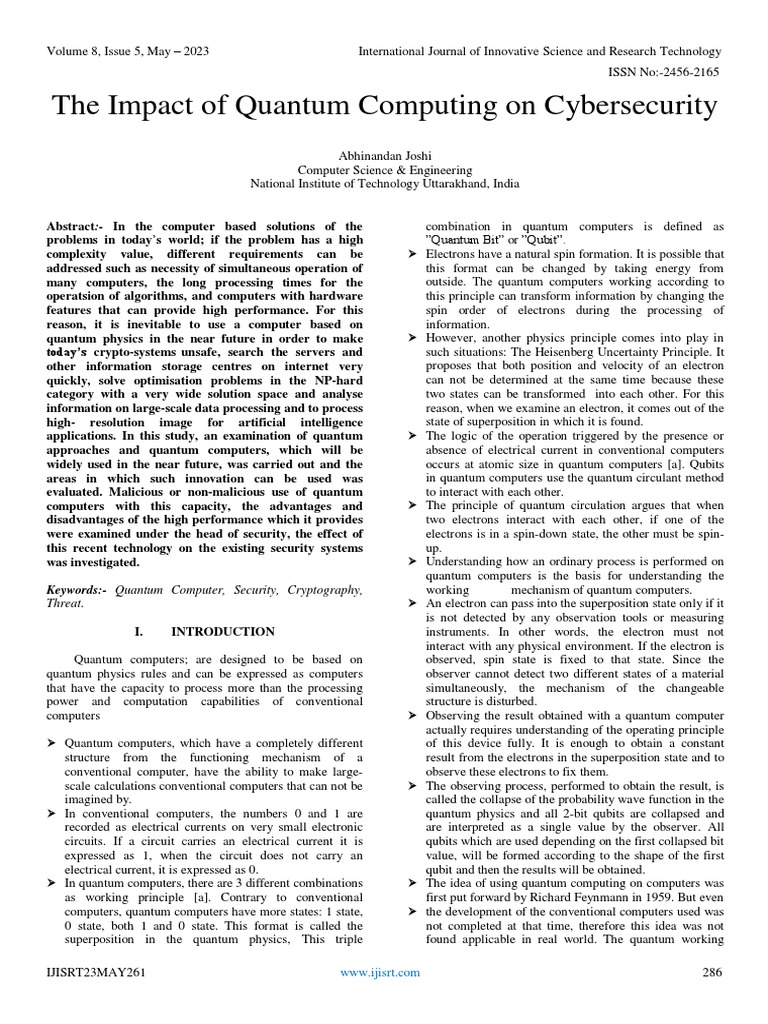In the ever-evolving landscape of technology, the advent of quantum computing presents profound implications, particularly in the realm of cybersecurity. This nascent yet formidable domain raises critical questions about the safeguarding of sensitive information in a world where traditional encryption methods may soon be rendered obsolete. The juxtaposition of quantum computing with conventional cybersecurity practices invites us to explore its relevance through a multifaceted lens.
To appreciate the impact of quantum computing on cybersecurity, one must first consider the distinguishing features of quantum mechanics. Unlike classical systems that operate on binary principles, quantum computing harnesses the peculiar behavior of qubits—entities that can exist in superpositions, enabling them to represent multiple states simultaneously. This quantum simultaneity allows for computational processes that far surpass the capabilities of classical systems. Such an exponential leap in processing power introduces a considerable gravitational pull on the fabric of cybersecurity.
At the heart of modern cryptography lies the principle of mathematical complexity. Algorithms commonly employed, such as RSA and ECC (Elliptic Curve Cryptography), hinge on problems deemed infeasible for classical computers to solve in a reasonable timeframe. Herein lies the crux of the concern: Quantum computers, through their potential ability to execute Shor’s algorithm, could efficiently factor large integers and solve discrete logarithms. Consequently, what is mathematically Herculean for classical machines becomes trivial for quantum disruptors, potentially dismantling the bedrock of digital security.
Moreover, the threat is not anchored solely to the realm of decryption but extends to the broader sphere of data integrity and authenticity. Quantum computing could undermine the establishment of secure communication channels that businesses, governments, and individuals alike rely upon. The existential dread of a post-quantum world, where sensitive data can be deciphered effortlessly, is not unfounded. This paradigm shift suggests that the custodians of cyber data must brace for an onslaught of vulnerabilities previously deemed impenetrable.
Yet, amidst this disquietude lies a unique appeal; the same principles that give rise to quantum threats also inspire innovative solutions. The field of post-quantum cryptography seeks to develop algorithms resistant to the adversarial capabilities of quantum processors. By leveraging mathematical constructs that remain computationally hard even for quantum machines, researchers aim to fortify the cyber domain against futurist incursions. This proactive approach imbues an optimism rooted in the idea that humanity can adapt and mitigate potential threats.
In this context, the development of quantum key distribution (QKD) offers a glimpse into a more secure future. Utilizing the principles of quantum entanglement and the no-cloning theorem, QKD allows for the secure transmission of keys essential for encryption. Here, an intriguing metaphor emerges: quantum key distribution is akin to sending an unbreakable lock through the post, where any attempt to eavesdrop alters the key itself, alerting the sender to potential breaches.
Despite its promise, the integration of quantum technologies into cybersecurity frameworks is fraught with challenges. The immaturity of quantum computing technology means that practical quantum attacks remain largely hypothetical. Yet, the ticking clock of progress necessitates a strategic shift in cybersecurity planning. Organizations must cultivate a culture of foresight, investing in research and development to transition from legacy systems vulnerable to obsolescence into a resilient, quantum-ready infrastructure.
As quantum computing continues its inexorable ascent, the implications for national security cannot be overstated. Governments worldwide grapple with the dual challenge of maintaining security while fostering innovation. The geopolitical landscape may undergo drastic transformation as nation-states either lead or lag in the quantum race. The prowess of quantum-equipped adversaries raises pertinent questions around espionage and data sovereignty, reframing the battleground of cybersecurity into a global chess game rife with uncertainty.
Additionally, beyond the immediate implications on cryptography, quantum computing heralds a new era of data analytics—potentially revolutionizing threat detection and incident response frameworks. Algorithms powered by quantum computing could analyze vast datasets in unprecedented timelines, enabling real-time responses to threat vectors that previously required extensive periods for detection and mitigation. This promises a more dynamic cybersecurity environment, one that evolves in tandem with the threats it confronts.
To conclude, the relevance of quantum computing to cybersecurity cannot be overstated. This technological duality encapsulates a spectrum of challenges and opportunities, prompting a reexamination of entrenched practices and the exploration of innovative countermeasures. As the quantum frontier expands, embracing this shift will be paramount for entities aiming to navigate the precarious waters of cybersecurity. The ongoing dialogue surrounding quantum threats and responses not only delineates the future of data security but serves as a testament to human ingenuity in the face of profound change. Thus, one might consider quantum computing not merely as a harbinger of disruption but as a catalyst for an evolution in our understanding and practices of cybersecurity.












